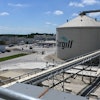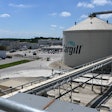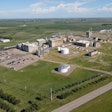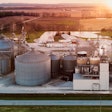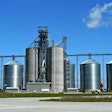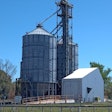一个创新的酿酒厂在阿拉斯加已经安装了一个nic horn to help improve ash flow and prevent clogging in the exhaust stream of an ingenious hybrid boiler system that uses spent grain from the brewing process as fuel. Ash accumulation issues had been forcing the company to shut down its equipment to cool and manually clean the swirlers and collectors of its ash handler on a weekly basis. The process required an outage of 3-4 days, including as much as twelve hours of maintenance time with bottle brushes and bead blasting.
Instead of shutting down the equipment after just 25 hours of operation, company officials now report that the system can complete an entire brewing cycle, with little or no performance loss in 94 hours of boiler run time. The acoustic cleaner from Martin Engineering (Neponset, IL) is viewed as a key element in developing an ash handling process that meets the firm’s goals for both efficiency and environmental stewardship.
Alaskan Brewing Company is the first brewery opened in Juneau since Prohibition, and from its beginning in 1986, owners Marcy and Geoff Larson sought to establish a process for making high quality craft-brewed beer, one that was both cost-efficient and environmentally responsible. “Supplies and fuel are expensive here, due to the distances involved,” observed Maintenance Supervisor Suki Patterson. “Brewing in Alaska is a challenge, because everything other than labor and water has to be imported, so we’re always looking for ways to be creative in obtaining and using our resources.”
While other brewers sometimes add spent grain as supplemental fuel in their processes, the system at the Alaskan Brewing Company is thought to be the only one in the U.S. to use it as the sole source of boiler fuel, with any excess shipped out as cattle feed. “During our production cycle, we would have to burn hundreds of gallons of diesel fuel per day to fire the boiler,” Patterson explained. “With this system, we can use by-products from the brewing process, but that presents some unique issues. Conventional hog fuel boilers typically burn feedstocks that produce about 0.5% ash, while the spent grain that we use produces more than 5%.”
Process Equipment
The company’s equipment includes a Model N65 Firebox Boiler assembly, manufactured for King Coal Furnace (Bismark, ND) by Hurst Boiler & Welding Company (Coolidge, GA). The high-pressure firebox boiler with left side breeching operates at 125 PSI during the brewing process, achieving 6600 pounds of steam per hour from a furnace volume of 519 cubic feet.
To manage the ash and minimize emissions, a MulticloneâDust Collector from the Babcock & Wilcox Power Generation Group imparts a whirling motion to the ash-laden exhaust gas as it enters the multiple-tube cyclonic collector. This action generates centrifugal force that concentrates particles of entrained dust at the interior walls of the collecting tubes. The particles then fall and are discharged from the bottom of the tube, with clean gas exiting through the outlet at the collecting tube’s vertical centerline. The boiler also uses soot blowers on a timer to clear the fire tubes.
“Unlike other fuels typically used in the brewing process, dried grain also produces an extremely fine ash that readily absorbs moisture from the atmosphere,” Patterson continued. “It tends to develop a gummy texture, so it can collect on the interior surfaces and become difficult to remove.”
Intent on resolving the problem, Patterson researched the issue online, finding information on how brewers and other industries were successfully managing fine ash, aerosols and smoke particles. She contacted Martin Engineering to discuss potential solutions, and developed detailed engineering drawings of the system to help explain the situation and outline the operating conditions.
Although Martin Engineering had never sold its products to the brewing industry, the company has a nearly 70-year history of inventive designs to handle bulk materials and improve process flows. “The conditions resembled the issues we see every day in coal-fired power plants, biomass-fueled boilers and other applications,” recalled Product Specialist Mike Masterson. “Once we reviewed all the details, it appeared to be an environment in which a sonic horn could provide some significant benefit.”
Because Martin Engineering lacked any data on its sonic horns in this specific application, the company offered to ship an appropriately-sized model to the brewery on a trial basis, with the understanding that the product could be returned without charge if it was unsuccessful. The company also worked with Patterson and her crew to determine the optimum location and provide instruction on its installation at the intake of the 6-inch cyclone separator.
Acoustic Cleaning Technology
“Acoustic cleaning has been providing cost-saving solutions for decades in a variety of different industries and applications,” commented Rich Shields, Regional Manager for Martin Engineering. “It’s a proven technology that can raise throughput and reduce blockages in a very wide range of materials, preventing dry particulate build-up to increase system efficiency and service life, while reducing downtime and maintenance.”
The Martin®Sonic Horn is an acoustic cleaner that has been widely used in the process industries, particularly in cement manufacturing. In addition to its low cost of ownership, acoustic cleaning helps avoid structural fatigue or damage. Especially effective around tubes and behind obstacles, sonic energy de-bonds particulates with a 360-degree sweep, cleaning inaccessible surfaces.
The horns work by producing a low-frequency, high-pressure sound wave, which is created when compressed air flexes a titanium diaphragm in the sound generator. This sound wave is then magnified as it is emitted through the cleaner’s bell. The pressure causes dry particulate deposits to resonate and become fluidized, allowing them to be removed by constant gas flow or gravity.
As Masterson suspected, the technology worked well in this application, and Patterson saw immediate improvement after installation. “We’re still fine-tuning the process, and we may add a second horn in another location,” she said. “But our Plant Manager and Engineering Technician agree that this is an important first step in completely resolving our ash problems.”
When asked about the customer service she received from Martin Engineering’s staff, Patterson added: “Even though brewing is not an important market for Martin Engineering, they spent a lot of time to help resolve an issue that had been a nagging problem for us. It was a very small sale -- just one component -- but it meant a great deal to us. They have been great to work with.”
Martin Engineering supplies conveyor products, flow aids and industrial vibrators around the world for a wide variety of bulk material handling applications, including cement/clinker, rock/aggregate, coal, biomass, grain and other materials. Founded in 1944, Martin Engineering is the world leader in making bulk materials handling cleaner, safer and more productive. The firm is headquartered in Neponset, IL, offering manufacturing, sales and service from factory-owned business units in Brazil, China, France, Germany, Indonesia, Mexico, South Africa, Turkey, India and the UK, and under exclusive license with ESS Australia. For more information, visitwww.martin-eng.comor call (309) 852-2384. Global representatives for Martin Engineering can be found atwww.martin-eng.com/rep-finder.

.jpg?auto=format%2Ccompress&crop=faces&fit=crop&h=48&q=70&w=48)
